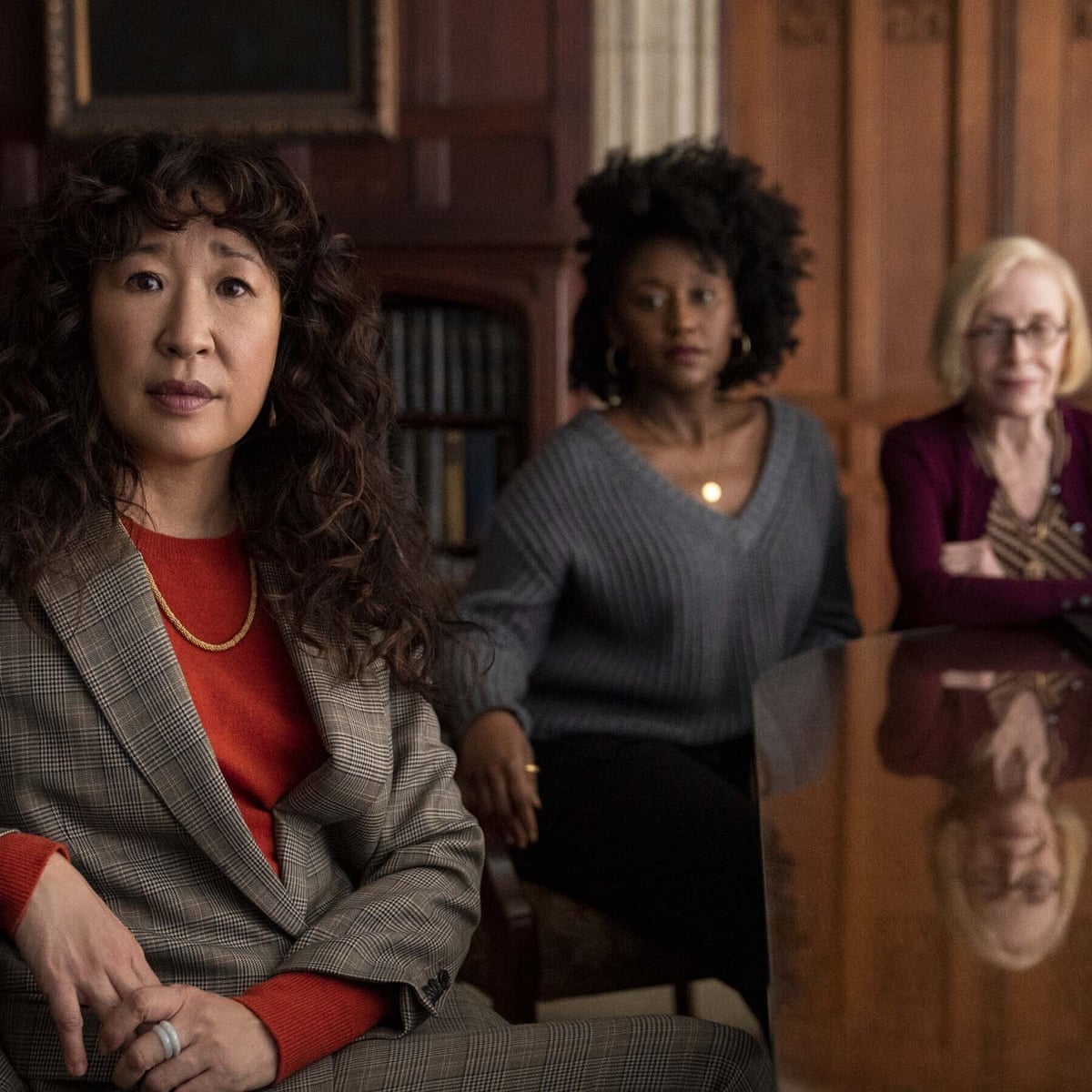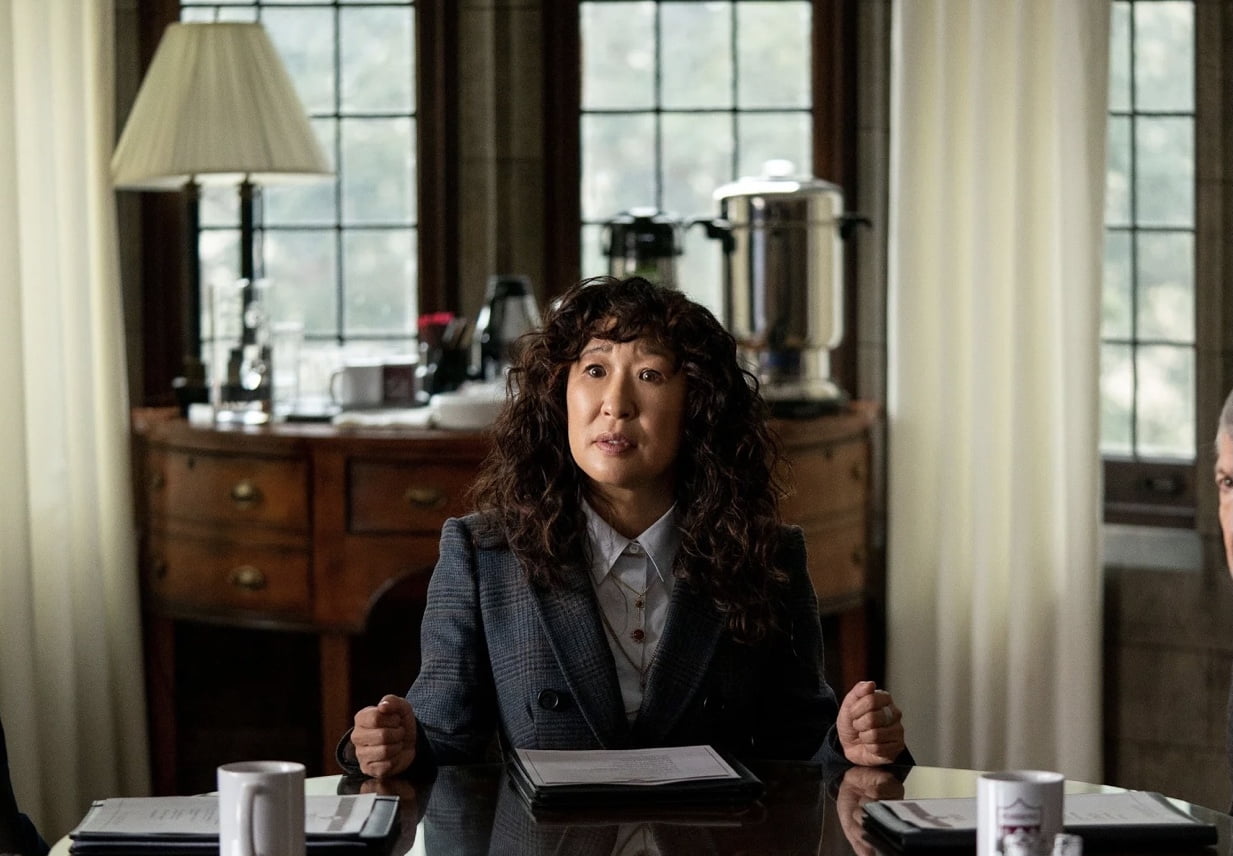“I don’t feel like I inherited an English department. I feel like someone handed me a ticking time bomb because they wanted to make sure a woman was holding it when it explodes.”
To mark a territory for ‘sociology of space’ would be restrictive if to acknowledge factors around gender, culture, region, class, caste as intersectional phenomena. Therefore, for context, here’s placing Netflix’s The Chair over the underlying wider theme of spatial sociology. Sandra Oh plays an Asian Professor Ji-Yoon Kim as the newly appointed, first woman chair of the English department in Pembroke University; the year for a ‘first women chair’ being way more recent than it should be! Following a feminist approach is to see how women negotiate ‘space’ among fellow women.
Also read: The Chair Review: A Concise Take On All That Ails Academia
Interesting enough is the time at which Ji-Yoon is appointed in such a role. The department, predominantly white, male, is already collapsing with lack of funds, stunningly low enrollments and the very aged faculty who no longer seem to grab attention or even upgrade their teaching methods in catering to younger generation of students. Soon after joining, Yoon is ordered to issue ‘forced retirement’ of at least three of the faculties by the Dean, where negotiations are hard, given they are all tenured professors except one black, young Yaz McKay — the only untenured prof. Yoon is determined to change the scenario in terms of diverse cultural representation, women and more contemporary syllabi as well as teaching methods but the show gradually unfolds how even with the highest of qualification and most creative of ideas women even in position of considerable authority are scrutinised and eventually turned down by further higher, masculinist forces.
“You are gonna be the first tenured black woman in the department; That’s why am leaving.”
The department is exhausted with a generation of unwilling seniors fearing change, inadequate knowledge for newer developments and no attempts to improve. The classic mansplaining, stubborn male egos, unquestionably living off male privileges never stop even in the presence of a younger, equally qualified professor Yaz whose intention to be a team and sharing her contemporary thoughts (feminism, race, ethnicity, social media) and methods with the aged faculties are very clear. In fact, despite Yoon’s effort to place Yaz with another elder professor to co-teach a class, Yaz is treated as an assistant by him.
The classic mansplaining, stubborn male egos, unquestionably living off male privileges never stop even in the presence of a younger, equally qualified professor Yaz whose intention to be a team and sharing her contemporary thoughts (feminism, race, ethnicity, social media) and methods with the aged faculties are very clear. In fact, despite Yoon’s effort to place Yaz with another elder professor to co-teach a class, Yaz is treated as an assistant by him.
Contrary to ‘age is non-functional’ debate, is professor Joan Hambling, the only white, senior, female faculty with most of her youth spent competing with other males, paid less, remaining an assistant prof. and never could become a professor. She is more like an elderly version of both Yoon and Yaz from a time when it took all of women’s strength to stay in the race rather than come out of it as a leader. Joan was relocated to a poor basement room while the senior male professors enjoy a more furnished setting. An enraged Joan sets poor student reviews of her lecture on fire, yelling “The Canterbury Tales is network of genius. Philandering husbands, horny housewives, farting, sh*tting, pubic hair. Some poor smuck asked a woman for a kiss and ends up making out with her butthole. That’s fate I’m wishing for you”.

The politics of space for women starts when Yoon is entangled with so many ‘fixing’ responsibilities that despite her ardent desire she cannot stand with her women colleagues. Yoon encourages Joan to file a complaint against relocation but fails to show up for her in attending to turmoil created by another male professor, Bill Dobson; her friend and colleague recovering his wife’s death. Again, despite Yoon’s right to decide ‘distinguished lectureship’ award which she announces to be Yaz, the university offers it to some celebrity with the least of academic experience just for funds and publicity.
The message disseminated is “women exist to clean men’s mess”, be it domestic or public sphere. This elite narrative upon Indian scenario is best discussed against rural-urban continuum. Recent news about the resistance faced by ASHAs for using penis replicas as an endeavor to spread awareness in family planning proves just the point! Men are protesting their wives’ exposure to ‘obscenity and therefore withholding women’s rights to decide, educate and in fact, implying women’s ‘innocence’ is best preserved in them lacking knowledge, remaining ignorant.
The message disseminated is “women exist to clean men’s mess”, be it domestic or public sphere. This elite narrative upon Indian scenario is best discussed against rural-urban continuum. Recent news about the resistance faced by ASHAs for using penis replicas as an endeavor to spread awareness in family planning proves just the point! Men are protesting their wives’ exposure to ‘obscenity and therefore withholding women’s rights to decide, educate and in fact, implying women’s ‘innocence’ is best preserved in them lacking knowledge, remaining ignorant.
“Earlier, we used to counsel couples with pictures. But now, as soon as we take out the mould, the family members, especially the men, take offence because of stigmatization. They claim that we are shameless and corrupting their wives,” one of them said.
Being governmentally-recruited ‘women only’ group, the ASHAs aim to be more sensitive and comfortable for rural women to communicate on important matters like sex, sterilisation and birth control. But ultimately the decision is made by men (husbands) in allowing them to even begin this conversation.
Also read: A Look At 6 Popular Shows & Their Feminist Politics
Prerna Siwach’s case study of Mitathal Village, Haryana concludes how despite women’s involvement/representation in Panchayat presented as ‘women empowerment and leadership’, is a façade; “gender and space implicate each other and how the space is socially and culturally produced. Gender roles define the mobility of women; wherever her assistance is required, she is allowed to access that space, and public spaces being the most contested of all the spaces always require women to have legitimate reason for their presence.”
Anthropologist Karl Schmidt (1865) observed that traditionally, spaces are imagined as women (‘s bodies). He wrote, “The man appears as time incarnate, the incarnate process of becoming; woman as space, as being… On the one hand, we have the male: time, activity, mind/brain/head, and on the other we have the female: space and body/heart/belly. The male is body by virtue of his head alone.”
The Chair placed parallel to Indian contexts might seem unsophisticated but not different! When Yaz criticises Ji-Yoon’s leadership saying, “You act like you owe them something. Like you’re here because they let you be here, not because you deserve it. I mean, what are they without us at this point?” Ji-Yoon reacts defensively but cannot deny it. The argument arises that woman who manage to reach positions of power are still below an omnipresent patronising force. That space of authority is always ‘either me or her’ keeping women from making space for fellow ones. Unlike men, there isn’t enough to share for women!
Rivalry, unfair competitions, jealousy, desperation are very strategically sustained by patriarchal narratives like “women are women’s enemies”. Therefore, the climax where fearing their careers, the department along with Joan and Yaz passes ‘vote of no confidence’ against Yoon. The women’s participation surprises her but we see empathy, understanding for them on her face and the final twist is her act of resistance by nominating Joan as the new chair, bestowing her with the long overdue honor in her glorious old age. Reclaiming space and nurturing sisterhood.

While women empowerment, education, independence is buzz words, the double standards only guarantee the same as much as men can handle. Smart, but not too smart! ‘Too much’ is a threshold set by men to keep women within boundaries that sustain the ever existing ‘glass ceiling’ and dilemmas that often crowd most women’s lives between ambition and family. Women might just be living in ‘cancel culture’ since always, cancelled and criticised by the masculine society for choosing anything beyond the prescribed.
References
Sayantani has completed graduation in sociology from St.Xavier’s College(autonomous), and M.A from Calcutta University.She has always been passionate about books and words and have gradually developed a proclivity towards writing. Sociology has only done better in confronting her with issues on which she would like to articulate her opinion. She enjoys movies, series and further discussions on them. You can find her on Facebook and Instagram.




